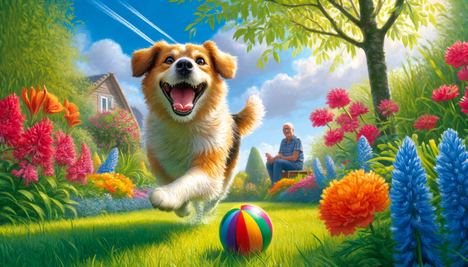Attribute "Playful"

The playful nature of dogs: More than just a fun factor
Have you ever wondered why some dogs just can't get enough of playing? These playful furry friends bring joy into our lives and ensure that we never get bored. But what exactly does it mean when a dog is described as "playful"? In this article, we take a deep dive into the world of playful dogs and discover what this characteristic means for you and your four-legged friend.
What does "playful" mean in a dog?
The trait "playful" describes a dog that is particularly active and lively and has a strong tendency to play. Such dogs love to move around, explore new things and interact with their humans or other dogs. Playfulness can manifest itself in various forms, from boisterous games in the garden to intelligent brain games that challenge the dog mentally.
Characteristics of a playful dog
Energy and activity
Playful dogs are often full of energy. They love to run, jump and romp. Their high level of activity requires regular exercise and plenty of opportunities to let off steam. Long walks, playtime in the park and dog sports such as agility or flyball are ideal for channeling their energy.
Curiosity and a spirit of discovery
A playful dog is often also very curious. They want to explore everything and are always on the lookout for new adventures. These dogs are brave and not afraid to discover new places and things. This makes them ideal companions for people who enjoy being outdoors and want to explore the world together with their dog.
Social behavior
Playful dogs are generally very social. They enjoy the company of people and other dogs and are often the stars of the dog park. Their open and friendly nature makes it easy for them to make friends and get along in different social situations.
Advantages of a playful dog
Physical health
A playful dog stays in good physical condition due to its high level of activity. Regular exercise strengthens the cardiovascular system, promotes muscle development and keeps weight in a healthy range. Play and exercise are therefore not only good for your dog's mind, but also for his body.
Mental stimulation
Playing not only challenges the dog physically, but also mentally. Brain games, search games and interactive toys promote mental fitness and prevent boredom. A busy dog is happier and less prone to behavioral problems.
Strengthening the bond
Playing together strengthens the bond between you and your dog. It creates trust and promotes communication. If you spend time with your dog and actively play with him, he will feel even more connected to you.
Challenges of a playful dog
Need for exercise and attention
Playful dogs need a lot of exercise and attention. If you have such a dog, you should be prepared to devote enough time and energy to it. An underemployed dog can quickly become frustrated and bored, which can lead to unwanted behavior.
Adapting to different lifestyles
Not every lifestyle suits a playful dog. If you work a lot or have little time for extended walks and playtime, it may be difficult to meet the needs of such a dog. It's important to take this into consideration when choosing a dog.
Conclusion
A playful dog can bring an incredible amount of joy and energy into your life. These dogs are not only great playmates, but also loyal companions that provide lots of fun and exercise. If you are willing to meet the needs of a playful dog, you will be rewarded with a happy and healthy four-legged friend who will enrich your life.
Remember that every dog breed and every individual dog is unique. Playfulness can vary and it's important to consider your dog's individual character.


